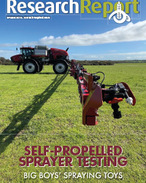This article is 9 years old. Images might not display.
In April this year the country's largest milk processor Murray Goulburn unexpectedly slashed the price of milk retrospectively, the decision was quickly adopted by other producers, causing a crisis for dairy farmers.
Dairy industry bodies announced Murray Goulburn and other processors have agreed to draft a voluntary code of conduct, in what is seen as a major milestone for farmers.
President of the United Dairy Farmers of Victoria, Adam Jenkins said the organisation worked hard since the crisis unfolded in April to get everyone in a room to hash out the issues and put forward a case to ensure future milk supply agreements are balanced, fair and transparent.
"It's been a long process to pin down the processors and get them to agree to meet with us, but with intervention from the Federal Government, we've been able to achieve a major step forward for the dairy industry in ensuring farmers are never again forced to retrospectively repay their earnings due to milk price cuts," Jenkins said.
"Now we'll work together to develop a draft Code of Conduct which will improve transparency and business to business relations before unfair contracts legislation comes into force next month," he said.
"The code will address pricing adjustments and ensure farmers receive all payments accrued over the term of a contract, and ensure that there are no retrospective price cuts."
The agreement comes after Australian Dairy Farmers brought processors, farmers, regulators and government representatives together at a meeting in September.
This news comes as Dairy Australia's latest Situation and Outlook report concedes while commodity prices have recovered slightly, low farm gate prices will continue.
Dairy Australia senior analyst John Droppert said Australia's milk production was forecast to drop five per cent, over 2016/17, as a result of low milk prices, tight margins, the ongoing impacts of flooding and excessive rain.
"It's definitely better than this time last year, but it's a question of how much and how soon the recovery will occur. It's obvious things are still pretty tough on farm," Droppert said.
"The pain that many farmers in southeast Australia experienced last season, and the ongoing challenges around margins will prove significant obstacles for some processors in securing supply in the short term," he said.
"Overall milk production will remain constrained in southeast states as farmers defer investment and focus on management to breakeven points, and conserving equity where margins are negative."























